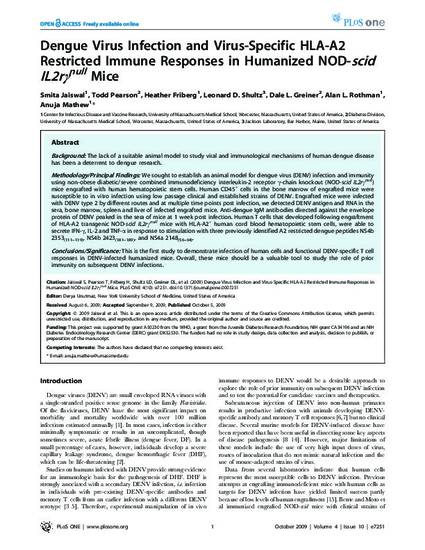
BACKGROUND: The lack of a suitable animal model to study viral and immunological mechanisms of human dengue disease has been a deterrent to dengue research.
METHODOLOGY/PRINCIPAL FINDINGS: We sought to establish an animal model for dengue virus (DENV) infection and immunity using non-obese diabetic/severe combined immunodeficiency interleukin-2 receptor gamma-chain knockout (NOD-scid IL2rgamma(null)) mice engrafted with human hematopoietic stem cells. Human CD45(+) cells in the bone marrow of engrafted mice were susceptible to in vitro infection using low passage clinical and established strains of DENV. Engrafted mice were infected with DENV type 2 by different routes and at multiple time points post infection, we detected DENV antigen and RNA in the sera, bone marrow, spleen and liver of infected engrafted mice. Anti-dengue IgM antibodies directed against the envelope protein of DENV peaked in the sera of mice at 1 week post infection. Human T cells that developed following engraftment of HLA-A2 transgenic NOD-scid IL2rgamma(null) mice with HLA-A2(+) human cord blood hematopoietic stem cells, were able to secrete IFN-gamma, IL-2 and TNF-alpha in response to stimulation with three previously identified A2 restricted dengue peptides NS4b 2353((111-119)), NS4b 2423((181-189)), and NS4a 2148((56-64)).
CONCLUSIONS/SIGNIFICANCE: This is the first study to demonstrate infection of human cells and functional DENV-specific T cell responses in DENV-infected humanized mice. Overall, these mice should be a valuable tool to study the role of prior immunity on subsequent DENV infections.
Available at: http://works.bepress.com/alan_rothman/25/